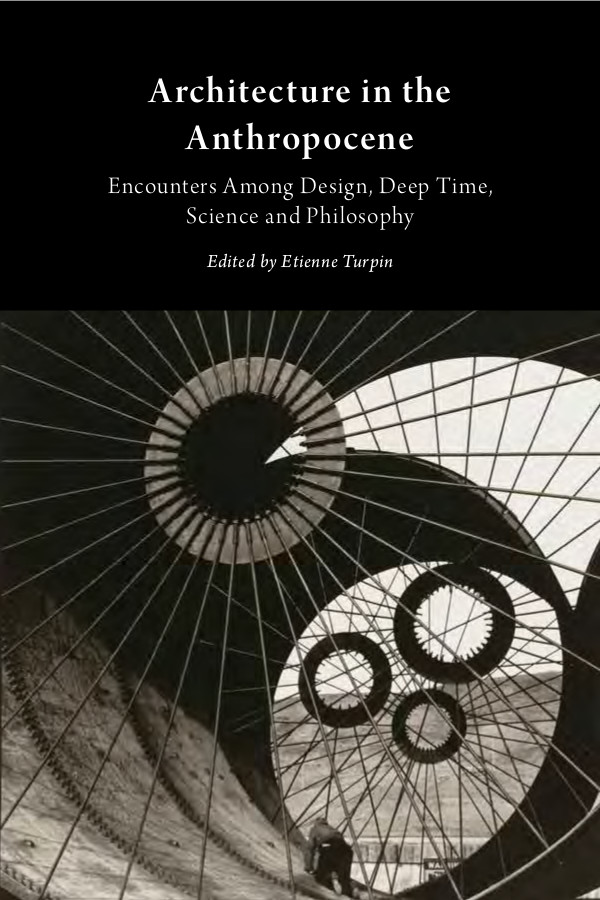Etienne Turpin (ed.): Architecture in the Anthropocene: Encounters Among Design, Deep Time, Science and Philosophy (2013)
Filed under book | Tags: · anthropocene, architecture, climate, climate crisis, design, earth, ecology, geology, meteorology, philosophy, science, time, weather

“Research regarding the significance and consequence of anthropogenic transformations of the earth’s land, oceans, biosphere and climate have demonstrated that, from a wide variety of perspectives, it is very likely that humans have initiated a new geological epoch, their own. First labeled the Anthropocene by the chemist Paul Crutzen, the consideration of the merits of the Anthropocene thesis by the International Commission on Stratigraphy and the International Union of Geological Sciences has also garnered the attention of philosophers, historians, and legal scholars, as well as an increasing number of researchers from a range of scientific backgrounds. Architecture in the Anthropocene: Encounters Among Design, Deep Time, Science and Philosophy intensifies the potential of this multidisciplinary discourse by bringing together essays, conversations, and design proposals that respond to the “geological imperative” for contemporary architecture scholarship and practice.”
Contributors include Nabil Ahmed, Meghan Archer, Adam Bobbette, Emily Cheng, Heather Davis, Sara Dean, Seth Denizen, Mark Dorrian, Elizabeth Grosz, Lisa Hirmer, Jane Hutton, Eleanor Kaufman, Amy Catania Kulper, Clinton Langevin, Michael C.C. Lin, Amy Norris, John Palmesino, Chester Rennie, François Roche, Ann-Sofi Rönnskog, Isabelle Stengers, Paulo Tavares, Etienne Turpin, Eyal Weizman, Jane Wolff, Guy Zimmerman.
Publisher Open Humanities Press, December 2013
Critical Climate Change series
Creative Commons Attribution Non-Commercial No-Derivatives 3.0 Licence
ISBN 1607853078, 9781607853077
250 pages
HTML (added on 2016-7-19)
PDF, PDF, PDF (10 MB, updated on 2016-7-19)
Owen Hatherley: Militant Modernism (2009)
Filed under book | Tags: · aesthetics, architecture, avant-garde, constructivism, design, film, modernism, theatre, vorticism
![]()
“This book is a defence of Modernism against its defenders. In readings of modern design, film, pop and especially architecture, it attempts to reclaim a revolutionary modernism against its absorption into the heritage industry and the aesthetics of the luxury flat. Militant Modernism features new readings of some familiar names – Bertolt Brecht, Le Corbusier – but more on the lesser known, quotidian modernists of the 20th century. The chapters range from a study of industrial and brutalist aesthetics in Britain, Russian Constructivism in architecture, the Sexpol of Wilhelm Reich in film and design, and the alienation effects of Brecht and Hanns Eisler on record and on screen – all arguing for a Modernism of everyday life, immersed in questions of socialism, sexual politics and technology.”
Publisher Zero Books, 2009
ISBN 1846941768, 9781846941764
146 pages
Reviews: Will Self (London Review of Books, 2012), PD Smith (The Guardian, 2009), Jonathan Meades (New Statesman, 2009), Dan Hicks (Planning Perspectives, 2009), Kat Koh (2011).
Interview (Andrew Stevens, 3:AM Magazine, 2009)
Comment (0)Doreen Massey: For Space (2005)
Filed under book | Tags: · architecture, city, geography, globalisation, neoliberalism, place, politics, space, time

“In this book, Doreen Massey makes an impassioned argument for revitalising our imagination of space. She takes on some well-established assumptions from philosophy, and some familiar ways of characterising the twenty-first century world, and shows how they restrain our understanding of both the challenge and the potential of space.
The way we think about space matters. It inflects our understandings of the world, our attitudes to others, our politics. It affects, for instance, the way we understand globalisation, the way we approach cities, the way we develop, and practice, a sense of place. If time is the dimension of change then space is the dimension of the social: the contemporaneous co-existence of others. That is its challenge, and one that has been persistently evaded. For Space pursues its argument through philosophical and theoretical engagement, and through telling personal and political reflection. Doreen Massey asks questions such as how best to characterise these so-called spatial times, how it is that implicit spatial assumptions inflect our politics, and how we might develop a responsibility for place beyond place.
This book is “for space” in that it argues for a reinvigoration of the spatiality of our implicit cosmologies. For Space is essential reading for anyone interested in space and the spatial turn in the social sciences and humanities. Serious, and sometimes irreverent, it is a compelling manifesto: for re-imagining spaces for these times and facing up to their challenge.”
Publisher Sage, 2005
ISBN 1412903610, 9781412903615
222 pages
Review: Matthew Sparke (Progress in Human Geography).
Commentary: Ben Anderson.
PDF (no OCR, updated on 2021-1-25)
Comments (2)
